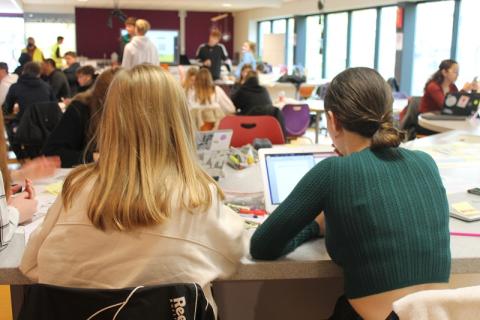Circular Innovation and Resilience through Challenge-based Learning and Entrepreneurship in the Young Innovators education programme (CIRCLE). CIRCLE aims to increase students’ understanding of the circular economy and their role as future entrepreneurs. Through an educational specialization and teacher training, it enables teachers and students to stimulate societal sustainability through circular entrepreneurship. Teachers will learn innovative methods to better teach about global sustainability challenges. The project aims to educate a generation of young people who are prepared for sustainable, circular entrepreneurship.
We will carry out this project together with partners from November 1, 2024 to April 30, 2027.
Activities
- Upgrade and further develop a specialized curriculum on circularity and entrepreneurship for high-school students, including lesson plans, lecture notes and slides;
- Build a circularity ecosystem with a role of entrepreneurs in sharing challenges, guidance and mentorship;
- Pilot the curriculum and progressively expand the implementation of our renewed specialization;
- Execute a marketing and dissemination strategy showcasing successful outcomes of student-business cooperation in our framework.
Results
- 2500 students educated in circularity and entrepreneurship;
- 100 teachers trained in CIRCLE methodology;
- 20 events;
- 50 panel members (role models);
- 50 entrepreneurs in our ecosystem;
- 5 different schools per country, totalling a minimum of 25 schools involved in CIRCLE.
We expect to:
- Increase teachers ability to instruct on circularity;
- Increase student’s knowledge of CE, systems thinking, and entrepreneurship;
- Increase collaboration between circular entrepreneurs and students.
Goals
The project's primary goal is to cultivate vital skills and competencies for collaborative work, essential for preparing future leaders and entrepreneurs to address contemporary challenges through teamwork and stakeholder engagement across communities and value chains. Central to this initiative is the integration of key European competencies (originating from the Young Innovators Framework) with challenge-based learning, visual collaboration tools, systems innovation, and empowering students to take on societal challenges as responsible citizens.
Neuroscience research demonstrates the manifold benefits of successful collaboration, including increased engagement, improved attention, enhanced learning through retrieval, negotiation of diverse perspectives, and augmentation of working memory resources. These findings underscore the broader educational objectives achievable through collaborative learning, such as promoting involvement, cooperation, teamwork, and civic responsibility (Frontiers in Psychology, 2021,12, https://doi.org/10.3389/fpsyg.2021.674369). The project prioritizes this collaborative approach by providing trainings for educators, focusing on specific tools to enhance teamwork skills in solving complex collective issues related to environmental challenges. Ultimately, the aim is to ensure the inclusion of all students in addressing challenges related to ecological transition.
Summarising:
- Environment and the fight against climate change: Teaching students about circularity from a systems thinking perspective is a fundamental step toward reducing carbon footprint and safeguarding the environment. By instilling principles of resource efficiency, waste reduction, and sustainable practices, students learn to make environmentally conscious choices.
This knowledge equips them to minimize the consumption of finite resources, decrease reliance on energy-intensive production processes, and actively participate in recycling efforts. As future leaders and consumers, these students will play a crucial role in fostering a circular economy, ultimately contributing to lower carbon emissions, conservation of natural resources, and a more sustainable, resilient environment. - Development of Key Competencies: Entrepreneurial skills, circularity, and systems thinking. We follow the definitions outlined in the European Commissions ‘EntreComp Framework’, with a focus on ‘Ideas & Opportunities’, ‘Resources’, and ‘Into Action’, with fifteen underlying competencies. We align with the Commission's actions on Entrepreneurship Education and with the research of Del Vecchio et al. (2021) who identify Entrepreneurship Education (EE) as a vital perspective for developing innovative competencies and mindsets for the Circular Economy.
- Supporting teachers: training them, providing up-to-date teaching materials, organizing cool challenge-based hackathon events in their schools.
Partners
Stichting Technotrend is applicant organisation of this project. The co-operating partners are: Budapest School Általános Iskola és Gimnázium, Hungary; Malta College of Arts Science and Technology, Malta PAOLA; Rigas Tehniska Universitate Riga, Latvia; Anna van Rijn College, Nieuwegein, Nederland; Cleantech Bulgaria Ltd. Sofia, Bulgaria and Systems Innovation Center Korlátolt Felelősségű Társaság Hungary.
Dit project wordt mede mogelijk gemaakt door Erasmus+


